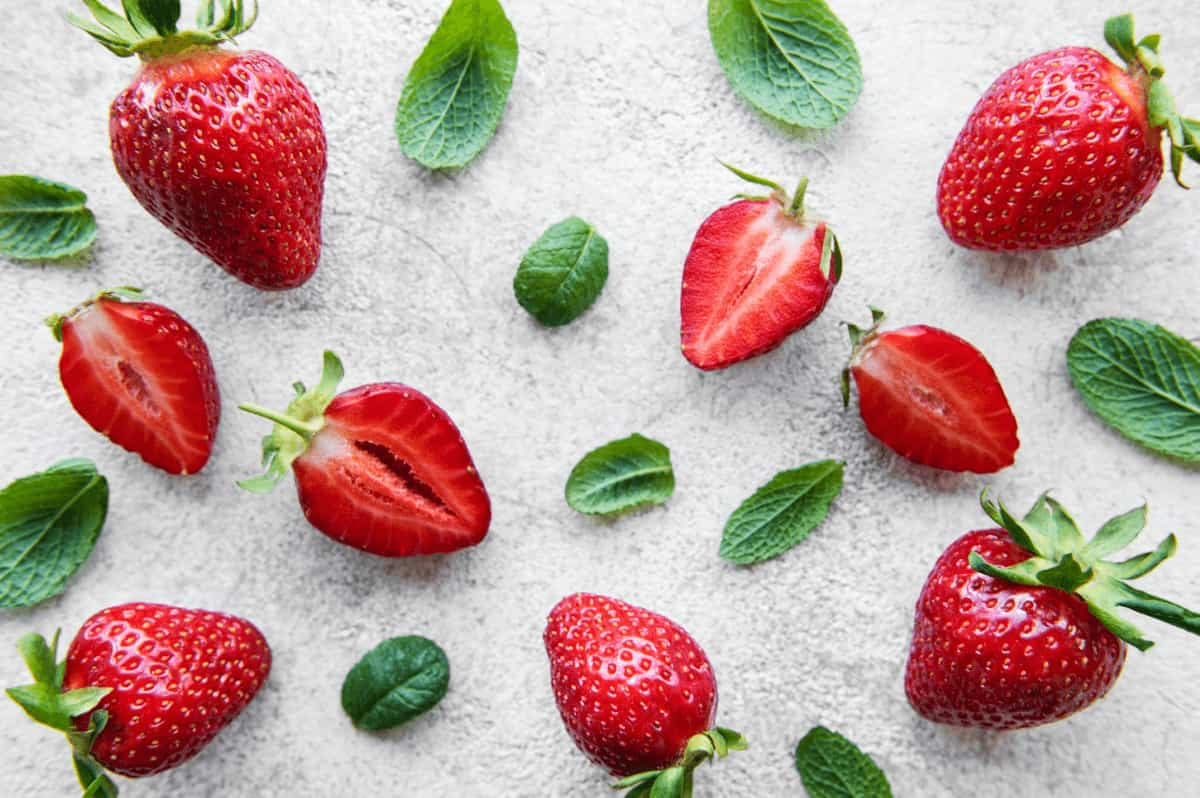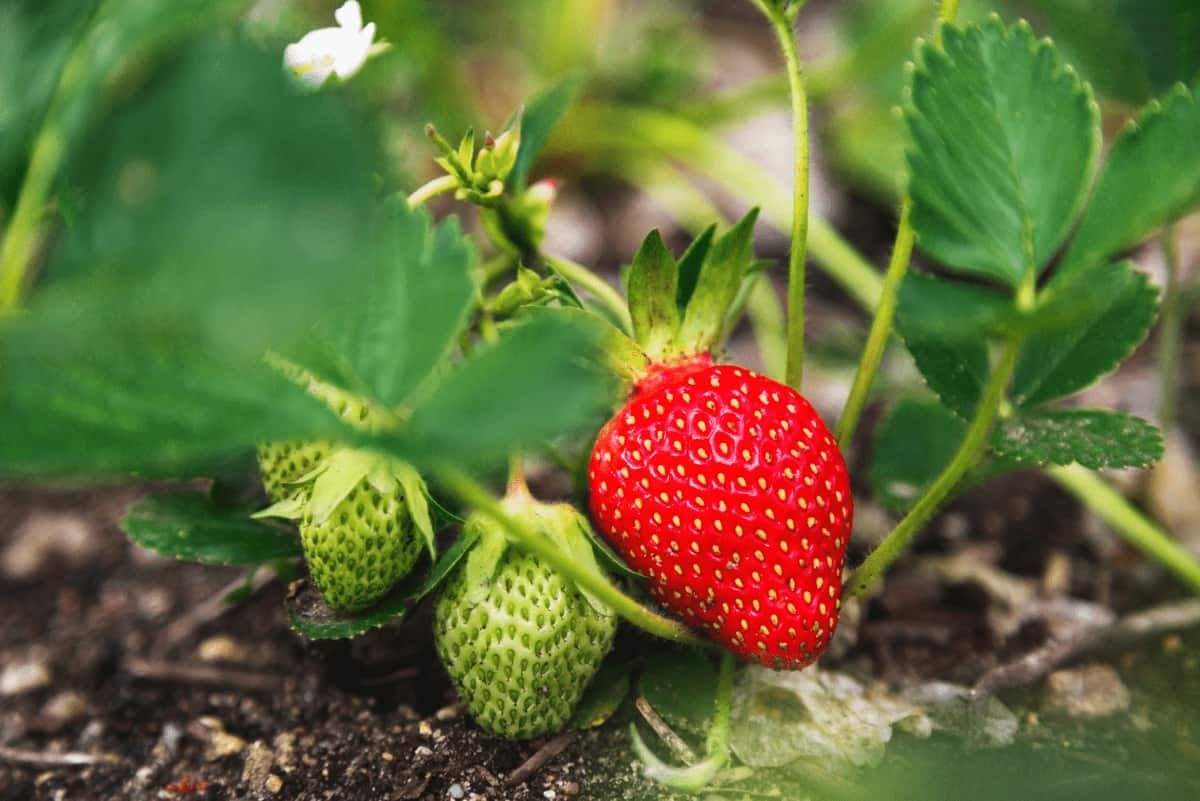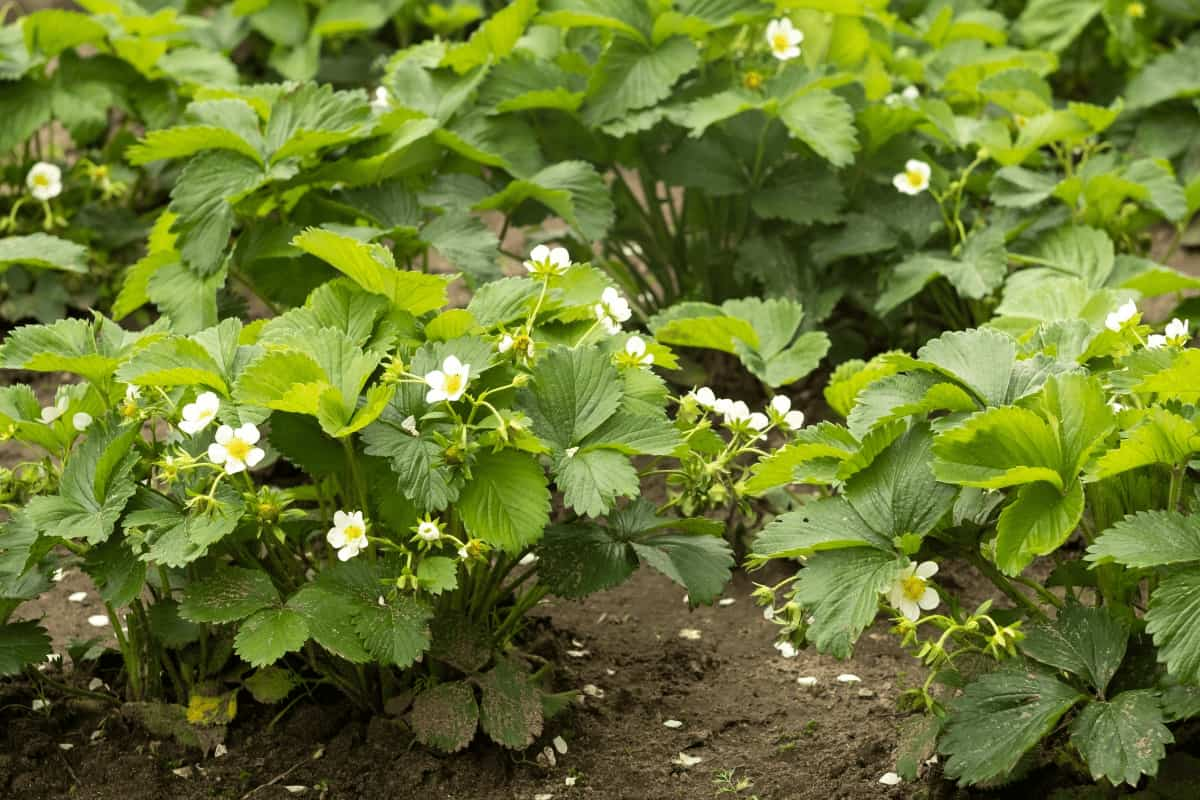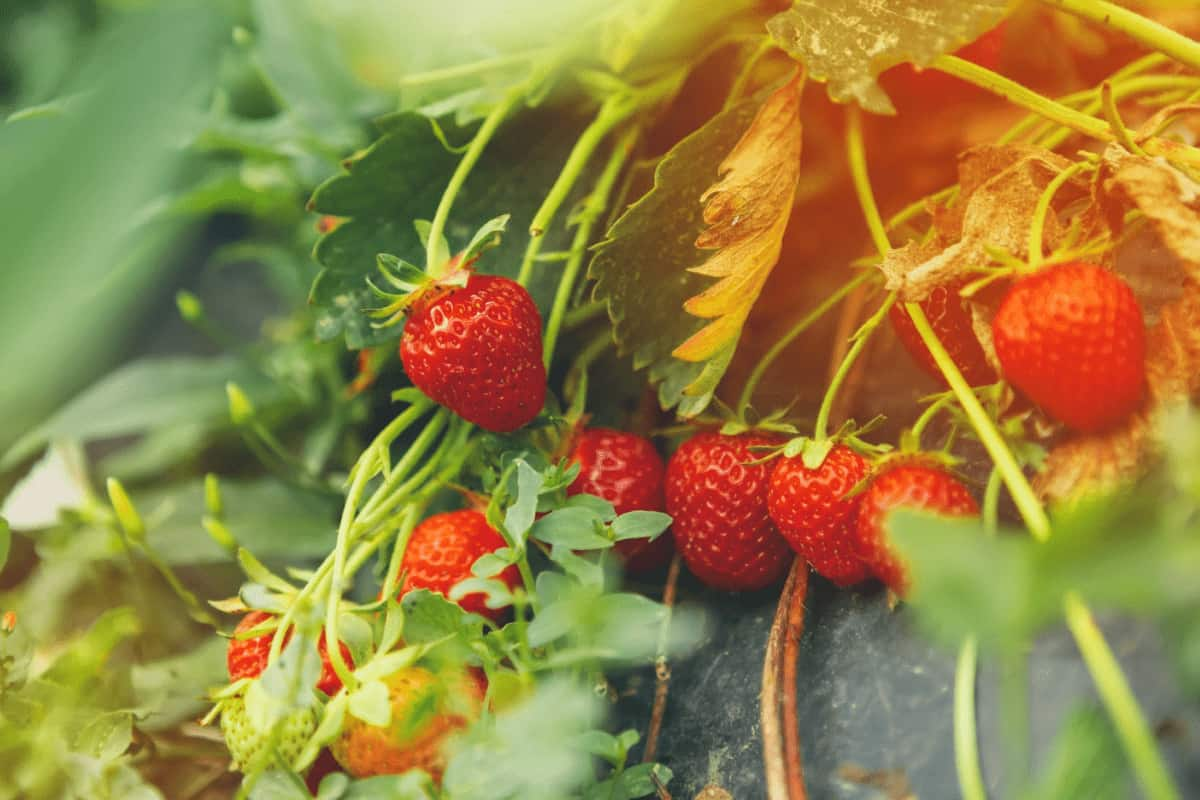Organic Strawberries are a delicious and healthy treat that many people enjoy. Not only do they taste great, but they are also free from harmful pesticides and chemicals. Growing organic Strawberries requires extra care and attention, but the rewards are worth it. When caring for organic Strawberries, attention to detail is key. These delicate fruits require proper care and maintenance throughout their growing season.

How to Grow Organic Strawberries
Understanding the Basics of Organic Strawberry Cultivation
First, it’s important to understand that organic Strawberry cultivation involves growing Strawberries without synthetic pesticides or fertilizers. Instead, natural methods promote healthy growth and protect against pests and diseases. One key aspect of organic Strawberry cultivation is selecting the right varieties for your climate and soil conditions.
Preparing the soil is crucial before planting your Strawberries. Once your soil is ready, it’s time to plant Strawberry seedlings. Be sure to space them properly, about 12-18 inches between each plant in rows spaced 3-4 feet apart. This allows enough room for air circulation, which helps prevent disease outbreaks.
Now let’s talk about weed control in organic Strawberry farms. Mulching with straw or landscape fabric can help suppress weeds. Hand-weeding may also be necessary from time to time, especially when starting. Regarding fertilization, there are various options available for organic Strawberry growers. Compost tea, fish emulsion, seaweed extract, and bone meal are all rich sources of nutrients that can be applied during different stages of growth.
Choosing the Right Strawberry Varieties for Organic Growth
Choosing the right Strawberry varieties for organic growth ensures a successful harvest. With so many options available, deciding which ones to plant can be overwhelming. Consider the climate and growing conditions of your region. Different Strawberry varieties have specific temperatures and soil requirements. Make sure to choose varieties that are well-adapted to your local environment.
Think about the size of Strawberries you prefer. Some varieties produce large berries perfect for fresh eating or making preserves, while others yield smaller fruits ideal for baking or adding to salads. Determine how you plan to use your Strawberries and select accordingly. Organic farming relies on natural pest control and disease prevention methods, so choosing disease-resistant Strawberry varieties will help reduce the risk of crop loss due to infections.
Preparing the Soil for Organic Strawberry Planting
First, choosing a location that receives at least six hours of sunlight each day is important. Strawberries thrive in well-drained soil, so avoid areas prone to waterlogging. Before planting, remove any weeds from the area. This will help reduce competition and create an optimal growing environment for your Strawberries. Consider using a garden fork or tiller to loosen the soil and improve its texture.
In case you missed it: Strawberry Fertilizer Requirements and Recommendations: Management for Optimal Yield

Next, test the pH level of your soil. Ideally, Strawberries prefer slightly acidic soil with a pH between 5.5 and 6.5. you can use organic and homemade fertilizers for Strawberries to adjust the pH by adding organic matter such as compost or peat moss. To further enhance nutrient availability in the soil, incorporate organic Strawberry fertilizers like composted manure or bone meal before planting. These natural amendments provide essential nutrients without synthetic chemicals. Once established, adding some form of mulch around your Strawberry plants is also advisable.
Implementing Effective Weed Control Methods in Organic Strawberry Farms
Implementing effective organic weed control methods for Strawberries is crucial for Strawberry farms to ensure the healthy growth and productivity of the plants. Weeds compete with Strawberries for nutrients, water, and sunlight, hindering their development and reducing yields. Fortunately, there are several organic techniques available for sustainably managing weeds.
One of the most common methods is manual weeding. This means physically removing weeds by hand or using handheld tools such as hoes or cultivators. It requires time and effort but allows for precise weed removal without chemicals. Mulching is another effective weed control method used in organic Strawberry cultivation. Applying organic mulch around the plants helps suppress weed growth. Mulch also retains moisture and regulates temperature, providing additional benefits to Strawberries.
Organic Fertilizers for Strawberry Cultivation
When it comes to growing Strawberries organically, choosing the best fertilizer for Strawberries is crucial for healthy plant growth and abundant fruit production. To enhance the natural sweetness of your Strawberries, consider using fertilizer to make Strawberries sweet. You should use a high-potassium fertilizer. Potassium plays a crucial role in enhancing fruit flavor by promoting sugar production.
What fertilizer for Strawberries in pots? With limited space and nutrients in containers, providing your Strawberry plants with a balanced and nutrient-rich diet is important. Organic fertilizers provide essential nutrients without synthetic chemicals or harmful additives. One popular option for organic Strawberry cultivation is compost. Another effective organic fertilizer for Strawberries is worm castings. These are the natural byproduct of vermicomposting (the process where worms break down organic waste).
Worm castings are packed with beneficial microorganisms that enrich the soil ecosystem, promote root development, and enhance nutrient absorption. Fertilizing Strawberries with coffee grounds has become increasingly popular among gardeners and for a good reason. Coffee grounds are not only a great fertilizer option for your Strawberry plants, but they also help to repel pests and improve soil structure.
Additionally, seaweed-based fertilizers can be valuable to any organic Strawberry farm. Seaweed contains many trace minerals that help boost plant immunity, improve disease resistance, and enhance overall crop quality. Is blood meal good for Strawberries? Incorporating bone meal into your Strawberry cultivation practices can also provide a significant source of phosphorus—a vital nutrient required for strong root development and healthy fruit production.
In case you missed it: 8 Common Problems with Garden-Grown Strawberries: How to Overcome Them

When growing Strawberries in pots, finding the right fertilizer is essential for their growth and productivity. One important factor to consider when choosing a fertilizer is its NPK ratio. NPK stands for nitrogen (N), phosphorus (P), and potassium (K). Each of these nutrients supports Strawberry plants’ overall health and development. You can use balanced Strawberry fertilizer NPK 10-10-10 or 20-20-20. Following a consistent Strawberry fertilizer schedule tailored to your organic Strawberry garden gives your plants the nourishment they need for healthy growth and bountiful harvests.
Protecting Organic Strawberries from Pests and Diseases
Disease Management in Organic Strawberry cultivation comes with challenges, and disease management is one of the biggest concerns for growers. While synthetic chemicals may be effective in conventional farming, organic farmers rely on natural methods to protect their crops from diseases. First and foremost, prevention is key. Start by selecting disease-resistant Strawberry varieties that are less susceptible to common ailments.
This will give you a head start in warding off potential problems. Next, practice good garden hygiene. Remove dead leaves or debris around your plants, which can harbor pests and diseases. Regularly inspect your Strawberry patch for signs of trouble, such as discolored leaves or wilting plants. Introduce beneficial insects into your garden.
These voracious predators will gobble up aphids, mites, and other unwanted critters that may harm your Strawberries. Consider planting companion flowers or herbs around Strawberries to attract pollinators and repel pests naturally. If, despite all precautions, some pests manage to find their way into your organic Strawberry patch, eco-friendly solutions remain. Neem oil is the best option as it acts as an insecticide and a fungicide while being safe for humans and wildlife.
Utilizing Natural Pollination Techniques for Organic Strawberry Production
Natural pollination techniques are essential for a successful harvest in organic Strawberry production. Pollination plays a crucial role in the growth and development of Strawberries, as it ensures the transfer of pollen. One effective method for promoting natural pollination is attracting bees and other beneficial insects. Bees are excellent pollinators and can significantly increase fruit set and yield.
To attract them, create an inviting environment by planting flowers that produce nectar and pollen nearby. Additionally, providing nesting sites such as bee hotels or leaving undisturbed areas with wildflowers can encourage their presence. Another technique you can employ is hand pollination. This involves manually transferring pollen from one flower to another using a small brush or cotton swab.
Hand pollination may be necessary if there’s a shortage of bees or if weather conditions hamper their activity. Ensuring proper spacing between plants also promotes better natural pollination in Strawberry fields. Adequate spacing allows air circulation around each plant, reducing resource competition and facilitating access for bees and insects.
Maintaining Proper Irrigation Practices in Organic Strawberry Farms
Proper irrigation is crucial for the success of organic Strawberry farms. Adequate moisture levels are essential for healthy plant growth and fruit development. It’s important to understand that Strawberries have shallow roots, so they require frequent but light watering. One effective method of irrigation is drip irrigation. This system minimizes water waste and reduces weed growth.
In case you missed it: Hydroponic Strawberry Farming in a Greenhouse: Key Rules to Start from Scratch

Drip irrigation also helps prevent foliar diseases by keeping the leaves dry. Monitoring soil moisture levels is key in determining when to irrigate your Strawberries. Mulching around Strawberry plants helps retain soil moisture and reduces evaporation. Organic mulch materials like straw or wood chips conserve water and suppress weeds, which compete with Strawberries for nutrients and water.
Conclusion
Growing Strawberries organically is a rewarding and environmentally-friendly way to enjoy this juicy fruit. Growing organic Strawberries requires careful attention to detail and a commitment to sustainable farming practices. By choosing the right varieties, preparing the soil, implementing effective weed control methods, utilizing natural pollination techniques, maintaining proper irrigation practices, and protecting against pests and diseases using organic methods, you can successfully cultivate delicious and healthy Strawberries.
- Feed Your Flock for Less: Top 10 Tips to Save on Chicken Feed
- Ultimate Guide to Ossabaw Island Hog: Breeding, Raising, Diet, and Care
- Hatching Answers: The Top 10 Reasons Your Chickens Aren’t Laying Eggs
- Eggs and Economics: Breaking Down the Cost of Raising Backyard Chickens
- Defend Your Greens: Proven Methods to Keep Iguanas Out of Your Garden
- Ultimate Guide to Cinnamon Queen Chicken: A Comprehensive Guide for Beginners
- Ultimate Guide to California Tan Chicken: Breeding, Raising, Diet, Egg-Production and Care
- Ultimate Guide to Marsh Daisy Chicken: Breeding, Raising, Diet, and Care
- 10 Types of Chicken Farming Businesses You Can Start for Profits